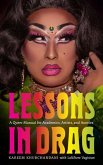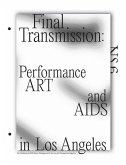
23,99 €
Erscheint vorauss. 22. Oktober 2025
Broschiertes Buch
A Queer Manual for Academics, Artists, and Aunties
22. Oktober 2025
Brandeis University Press

22,99 €
Versandfertig in 2-4 Wochen
5,99 €
Sofort per Download lieferbar
Ähnliche Artikel

24,99 €
Versandfertig in über 4 Wochen
Broschiertes Buch
Contesting Femininity in the World's Playground
18. Dezember 2020
Rutgers University Press

21,99 €
Versandfertig in über 4 Wochen
Broschiertes Buch
Drag Kings in the American South
15. Oktober 2021
Rutgers University Press

Broschiertes Buch
New Media, Globalization, and the Afterlives of Disaster
14. April 2023
Rutgers University Press

20,99 €
Versandfertig in über 4 Wochen

15,99 €
Versandfertig in über 4 Wochen

Broschiertes Buch
Ayuntamiento de Las Palmas de Gran Canaria - Promoción Las Palmas de Gran Canaria

Broschiertes Buch
Kinship, Gender, and Ethnicity in a Yoruba Town
15. Januar 2018
Indiana University Press

23,99 €
Versandfertig in über 4 Wochen

Broschiertes Buch
Argentine Tango Immigrants in New York City
2nd edition
26. September 2013
University of Arizona Press

17,99 €
Versandfertig in 2-4 Wochen
Ähnlichkeitssuche: Fact®Finder von OMIKRON
